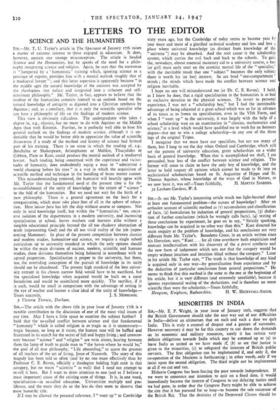Sta,—The article with the above title in your issue of
January 17th is a notable contribution to the discussion of one of the most vital issues of our time. May I have a little space to examine the subject further? I hold that the so-called conflict between science and that fundamental " humanity " which is called religion is as tragic as it is unnecessary— tragic because, so long as it exists, the human race will be baffled and frustrated in its search for the secret of full and happy living ; and unneces- sary because " science " and " religion " are twin sisters, bearing between them the lamp of truth to guide man to " the haven where he would be," the goal of all true philosophy, " Life abounding," to quote the greatest of all teachers of the art of living, Jesus of Nazareth. The story of this tragedy has been told so often (and by no one more effectively than by Professor C. E. Raven, officially a theologian holding high rank in that category, but no mean " scientist " as well) that I need not attempt to re-tell it here. But I want to draw attention to one (and as I believe a most important) cause of the existing state of things. It is, in one word, specialisation—in so-called education. Universities multiply and pro- liferate, and the more they do so the less do they seem to deserve that most honorific title.
If I may be allowed the personal reference, I " went up " to Cambridge
sixty years ago, but the Cambridge of today seems to become year by year more and more of a glorified technical academy and less and less a place where universal knowledge (as distinct from knowledge of the " universe ") may be absorbed. And the root cause. is the scholarship system, which carries the evil back and back to the schools. To gain the, nowadays, almost essential monetary aid to a university course, a boy (or girl) must early start on the eremitic mental life of the " specialist," with the inevitable result that one " subject " becomes the only subject there is worth his (or her) interest. So are bred " one-compartment " minds ; the minds which have made the conflict between science and religion inevitable.
I hope no one will misunderstand me (or Dr. C. E. Raven). I hold, as I know he does, that a rigid specialisation in the humanities is as bad as exclusive devotion to the physical sciences. To revert to personal experience, I was not a " scholarship boy," but I had the inestimable advantage of being educated at a great school which was so far in advance of its times as to frown on specialisation, even in the VIth Form, and when I "went up " to the university, it was largely with the help of a school scholarship won on an examination in " classics, mathematics and science," at a level which would have qualified me to work for an honours degree—but not to win a college scholarship—in any one of the three legs of the original Tripos.
I recognise that we must have our specialists, but not too many of them, but I long to see the day when Oxford and Cambridge, which still set the pattern of university education, grant scholarships on a wider basis of general knowledge. When that is accomplished we shall, I am persuaded, hear less of the conflict between science and religion. The former will cease to claim to have the only key of knowledge, and the latter to hold suspect all opinion which cannot be made to fit into an ecclesiastical scholasticism based on St. Augustine of Hippo and St. Thomas Aquinas, whose knowledge of the ways of God in Nature, as


































 Previous page
Previous page